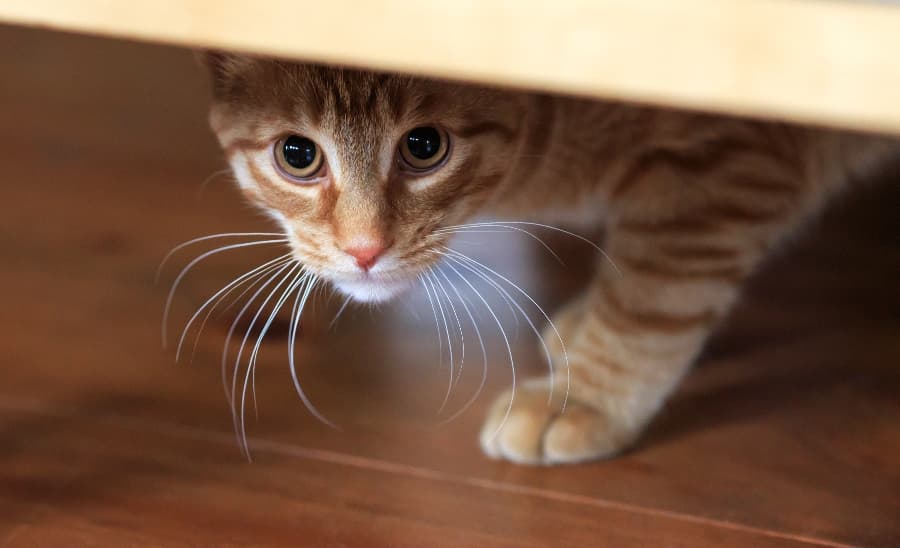
Cats can be hard to read sometimes. Cat anxiety solutions? They are a much more independent animals than dogs, so subtle differences in their behaviour may not seem so obvious unless you know what you are looking for.
Too often, unsuspecting pet parents chalk their kitty's odd or poor behaviour up to cats just being jerks, but these small attitude changes and habits could be a symptom of a much larger problem - cat anxiety. How to reduce cat anxiety? or How to help cat with fear or anxiety?
Can Cats Get Anxiety?
We often don’t think about mental health issues when it comes to our pets, but the fact is, cats (and dogs) can have trouble dealing with stress just like we do.
The independent manner of cats can make it tough to identify sometimes, but odd behaviours and changes to your cat’s normal habits are often a sign that they are unhappy with something going on in their environment or routine.
Cats hate change, so once they are accustomed to a certain routine, even small changes can make your cat feel out of sorts.
Cat Separation Anxiety
A common type of anxiety is called separation anxiety. This kind of anxiety is triggered by being left alone. Cats with separation anxiety hate being left home alone, so many of their destructive behaviours happen when you aren’t there to supervise them.
This type of anxiety can be the most dangerous for your cat because they could easily injure themselves, get stuck, or even escape your house and get lost.
Symptoms of Cat Anxiety
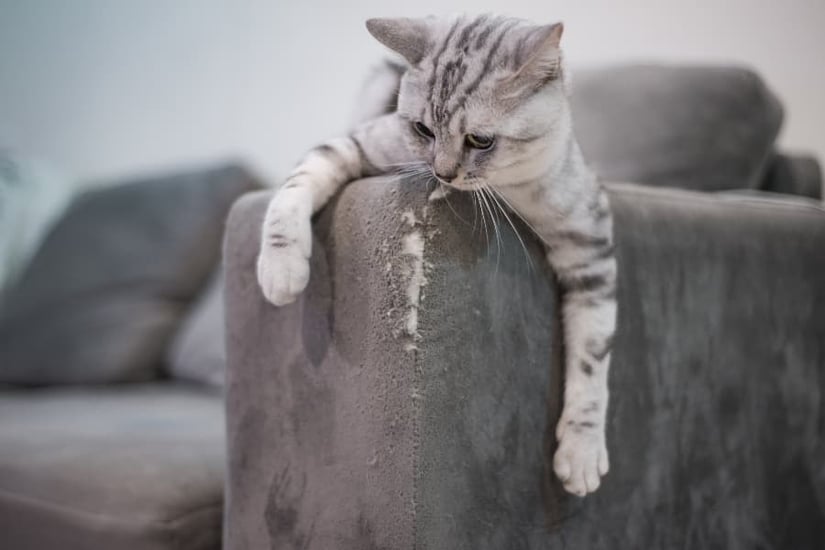
Cats often have very distinct personalities, and while there are some more obvious signs of a stressed-out cat, some symptoms may be unique to your cat’s normal behaviour and routine. You’ll need to look for things that are out of the ordinary when it comes to your cat’s habits and attitude.
Being able to identify signs of cat anxiety is the first step towards finding safe and appropriate solutions and, of course, helping calm down your cat. Take a look at some of the most common behaviours of cat anxiety:
Litter Box Issues
What may seem like a pretty common whoops may actually be a sign of your cat’s stress. Fear or anxiety can lead to your cat acting out by peeing outside of the litter box, especially on your belongings, like beds and laundry.
Cats who usually hide or cower may also get into the habit of going to the bathroom wherever they feel safe and hidden. This means that the accidents may go unnoticed until the problem becomes a recurring issue.
Scratching or Chewing
You may have noticed your cat occasionally scratching the corner of your couch or chewing on your curtains, but the more destructive that scratching and chewing, the more likely it is that your cat is feeling stressed and is finding ways to self-soothe or get attention.
Often this indicates a lack of stimulating options like cat trees or scratching in your cat’s environment. These can be a healthy stress-relieving outlet for cats, especially when they are spending time alone.
Aggressive or Defensive Behaviour
Sudden changes in your cat's behaviour are a good indicator that your cat is, at least, feeling out of sorts. If your cat is acting aggressively or defensively then they are telling you that their anxiety is getting the best of them.
The aggressive behaviour could be out of a fearful response caused by their anxiety, so they may swat at you when you reach out to pet them or bite aggressively when you get too close to their belongings.
Yowling or Crying
Quiet cats who suddenly get loud might be trying to tell you something. This is often interpreted to mean that your cat wants attention. They may walk around your feet meowing constantly or pace at night yowling loudly.
Though this behaviour can be pretty annoying, it’s one of the most obvious signs of feline anxiety. Take note of when and how often your cat is being abnormally vocal, and this may help you determine the triggers of your cat’s stress.
Over-Grooming
The most commonly missed sign of an anxious cat is overgrooming. Cats are normally adept groomers, so seeing them groom themselves regularly is not a cause for concern normally, but when grooming leads to hair loss, damage to the skin, or excessive hairballs, this is an issue.
Super stressed cats sometimes even pluck their hair out obsessively, so unchecked, this destructive behaviour can escalate to a serious problem.
Poor Eating Behaviours
Cats are notoriously picky eaters, but changes to your cat’s regular eating habits are a red flag. They may eat less volume, less frequently, or at odd hours. Their pickiness may also increase.
A consistent eating routine is important to your cat’s overall health issues, so changes to her food habits can lead to weight issues, muscle loss, and digestive issues. Monitor changes to eating habits during times of stress to help identify possible triggers.
Hiding or Cowering
Other changes like disinterest in playtime, neediness, aloofness or any other out-of-the-ordinary changes in your cat’s behaviour can be a sign that your cat is feeling stressed. One-off quirks aren’t usually a cause for concern, but it’s a good idea to take note of subtle changes just in case they persist or worsen.
How to Help a Cat with Anxiety
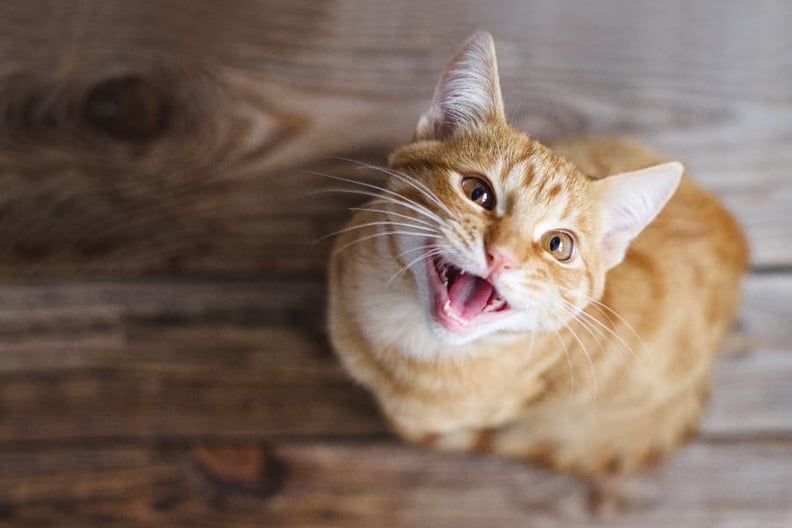
Once you’ve identified your cat’s anxiety, it’s time to figure out how to help them calm down. Your cat’s anxiety may be triggered by several factors, and oftentimes, a bad habit is built as a coping mechanism of the stressor.
You may have to retrain your cat to ditch the destructive behaviours or try natural calming solutions to help them relax. Figuring out what is causing your cat’s stress will help you choose an appropriate course of action.
Causes of Cat Anxiety
So why is your cat so stressed? Cats may seem stoic and disinterested at times, but they are very sensitive to even minor changes. If you suspect your cat is stressed out, then you need to try to determine what is causing your cat to feel so anxious.
Here are some things that might be contributing to your cat’s behavioural issues:
Schedule Changes
Changes to your schedule, like work or school, can have a big impact on your cat's normal routine. They get accustomed to the times you are home, so when that changes, your cat may start to act out.
Moving
Moving homes are one of the hardest situations for a cat to handle. Indoor cats especially no nothing outside of their home, so a big move can lead to your cat feeling confused and vulnerable.
New Family Member
A new addition to your home, like a baby or another pet, can be particularly unsettling for your cat. They may feel neglected or territorial by the new member of the family, leading to aggression or defensive behaviours.
Losing a Family Member
Regardless of who your cat picks as their person, your cat will form a bond with everyone in your house to some degree. When someone they are accustomed to suddenly leaves, this can be very confusing for your cat. A death in the family or even a member of the family moving out can cause your cat to lash out.
Illness or Injury
Cats are good at hiding pain and discomfort. It’s a natural defence mechanism for a wild cat to hide weakness from possible predators, and it’s something that your domesticated cat still does. Instead of whining or crying, your cat may show some non-verbal cues of stress.
Second-Hand Stress
Cats may not seem like the most loyal pets compared to dogs, but they can tell when tensions rise around them. This means that your stress hand signal could be the cause of your kitty's stress.
Retraining Good Cat Behaviours
The longer your cat is stressed, the more likely they are to build unhealthy and destructive habits. Even without the continued presence of a trigger or stressor, your cat may have gotten used to her new coping behaviours and will continue them.
It’s important to start replacing negative habits with positive ones as soon as you notice them. Re-training good behaviours in cats isn’t always easy, so make sure you are very consistent in your responses and never try to discipline your cat by yelling or striking them.
If they are fearful of you, then you will only exacerbate her stress and anxiety. Instead, build a routine for your cat that will help to incorporate appropriate behaviours and keep your cat both mentally and physically stimulated.
Tips for How to Calm Down a Cat
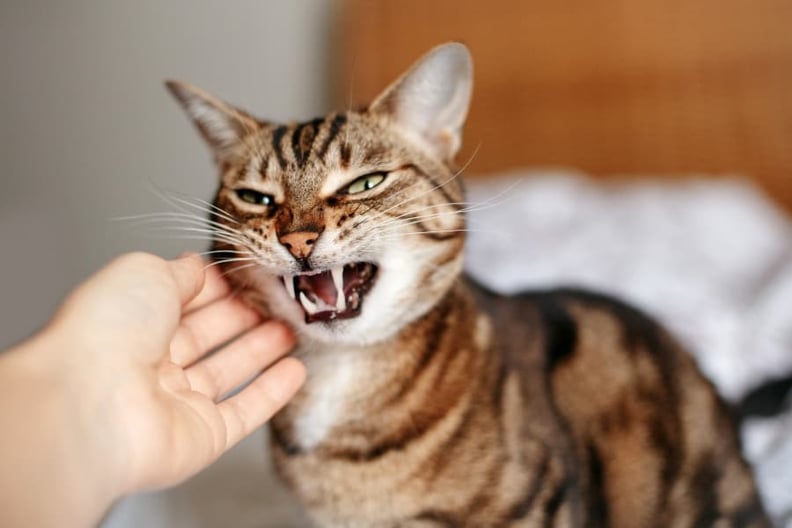
Calming down your cat isn’t going to happen overnight. Because your cat's environment often plays a significant role in anxiety, you need to take steps to help your cat adapt to a new routine. Some things are unavoidable, like a new baby or moving homes, so the best way to help calm your cat is to embrace the changes.
Build a new routine around your new circumstances as best you can. Life will always throw you curveballs every now and then, so lean into the things that stayed the same and help your cat adjust by being consistent and, most of all, patient.
Natural Cat Calming Solutions
To ease the process, natural cat calming solutions can be a lifesaver for cats that are feeling extra stressed and are struggling to handle change. These safe and non-invasive options can help your cat to naturally destress and get past her destructive habits. Here are our favourite calming solutions for cats:
Calming Cat Treats
Under the Weather Calming Soft Chews for Cats uses the calming power of l-theanine and tryptophan. These tasty fishy chews are a delicious snack that can help your cat relax at the same time. Calming cats with anxiety. They are vet-formulated to naturally reduce anxiety in cats and are perfect for cats that have known anxiety triggers, like fireworks, thunderstorms, and travelling.
Calming Diffusers
Nothing is more natural than the pheromones of a mother cat, so Feliway Classic Diffuser Starter Kit uses a synthetic pheromone that mimics the same signals that mother cats use to calm their kittens. The handy diffuser gives all day and night relief from anxiety.
Other Natural Calming Solutions
Omega Alpha E-Z Rest is another easy and non-invasive solution for your cat's stress. This formula uses a blend of three nervines helps to balance the central nervous system to keep your kitty calm. By promoting restfulness in your cat, you can safely quell stress and help cat stay calm in the presence of anxiety triggers.
Other Tips for Calming Down a Cat
Sometimes anxiety only shows its ugly head in specific situations. Though general anxiety treatments can still be effective, you may want to look into routines and tricks for managing anxiety under certain circumstances.
This can help to reduce the cat separation anxiety symptoms and prevent your cat’s anxiety in cats from getting worse, making it easier to identify triggers and build a routine that helps your cat build confidence and break the bad habits that come along with feline anxiety symptoms.
How to Calm Down a Hyper Cat
Some cats are just too high energy, so when they are understimulated both physically and mentally, which can lead to signs of anxiety and some very destructive behaviours. We aren’t just talking about the occasional case of the zoomies, but full over-the-top hyperactivity.
Hyperness can be a symptom of anxiety or it could just be your cat’s age or breed. Either way, if your cat is insanely high energy and is causing trouble or acting destructively, then you need to increase both his daily mental and physical activity.
Here are a few activities that can help:
-
-
- Teaching your cat to play fetch is a great high-impact workout. You can use treats to reinforce the game. Try using the stairs or long hallways to really get your cat running.
- Have you ever taken your cat for a walk? Walking your cat is a low-impact workout, but it’s a great way to exercise your cat’s mind. Learn more about walking your hyper kitty in How to Leash Training Your Cat.
- Try a cat puzzle toy to give your cat an opportunity to problem-solve. The more mentally exhausted your cat is, the less destructive she will be.
- Cat wheels are a great tool for cats that need frequent exercise because they can be used any time for as long as your hyper cat wants. They are expensive but cheaper than a new couch.
-

How to Calm Down a Cat at Night
Sometimes your cat’s anxiety kicks in at the least opportune time, like at 3 am when you are trying to sleep. It’s not uncommon for cats to follow a more nocturnal cycle, but when your cat starts acting out at night it’s important to find ways to help them self-soothe.
Cats look for natural ways to self-soothe, but not all methods are positive. For example, self-nursing and overgrooming are coping methods for anxiety that often lead to injury and skin and coat issues.
Replace these bad habits with some of these positive ones:
-
-
- Try a self-grooming tool, like this Catit Senses 2.0 self Groomer. This can help your cat satisfy their need to groom without harming themselves or damaging their beautiful coats.
- Leave a dim light on. If your cat is a little more active at night, then it’s a good idea to leave them a nightlight so that they can move about the house safely. Cats can’t see in the dark, contrary to popular belief. Instead, they can see much better than us in very low light.
- Give them their own space to sleep. A cat tree with an enclosed platform or a comfortable cat bed in a private place where they can sleep without distraction from people, other pets, or outside noises.
-
How to Calm Down a Cat in the Car
Cats are not notoriously good travellers, but sometimes, it’s necessary. Trips to the vet may be relatively short, but your cat may still go into full panic mode as soon as the car starts moving.
Car anxiety in cats is often more vocal than anything, especially if your cat is travelling in a secure carrier. They may yowl, cry, or even hiss for the whole trip, or worse, frantically try to escape.
Try these tips to keep your cat calm in the car:
-
-
- Position is everything. You may think having them in the front seat with you will be calming, but it’s often not. Place her in the back seat for both her safety and mental state.
- Keep her secure in the car by always travelling with your cat in a sturdy carrier. Carriers, like the Baxter & Bella Soft Carrier, are usually fabric or plastic and don’t have bars or wires that she can reach her paws through and possibly get injured in the process. This will also limit her sight and encourage her to sit or lay down.
-
How to Calm Down a Cat in Heat
Unspayed cats go through a recurring heat cycle, and it often comes along with some odd behaviours, like extra clinginess, increased vocal activity, and some extra energy. Though it’s part of a natural cycle, you may need to look for ways to help your hormonal kitty chill out.
Here are a few ways to calm down cats in heat:
-
-
- Cats in heat will seek out warm comfortable places, so try the K&H Bed Warmer to make her favourite place to nap and nice and toasty one.
- Cats in heat tend to be a bit needier, so you may need to schedule some extra play and cuddle time with your aroused little furball.
- Pheromone diffusers, like Feliway Calming Spray, could be very effective during your cat’s heat cycle. Her hormones are going to be going a little crazy, and a pheromone-based spray or diffuser will speak to your cat’s brain in a very primal way.
-
How to Calm Down a Cat After Moving
No matter how gracefully you handle the moving process, your cat is still going to need some time to get used to her new surroundings. The sounds, smells, and even sights are going to be unfamiliar all of a sudden, so you need to find ways to help cat adjust to such drastic changes.
Here are a few post-move tips for calming down your cat:
-
-
- Keep something that smells like you close to your cat during and after the move. Grab a worn t-shirt or blanket that, while seemingly unimportant to your cat, may carry a sense of familiarity that she needs to feel normal.
- Make a special area that is just for her containing her belongings, like a bed and toys. As soon as you get her to her new home, you want her to have a safe space where she can go to relax while she acclimates to her new home.
- Stick to her old routine as best you can. There will be inevitable changes, but keep mealtimes and playtime as consistent as you can. This limits the number of changes your cat has to handle all at once.
-
Every Cat Is Different
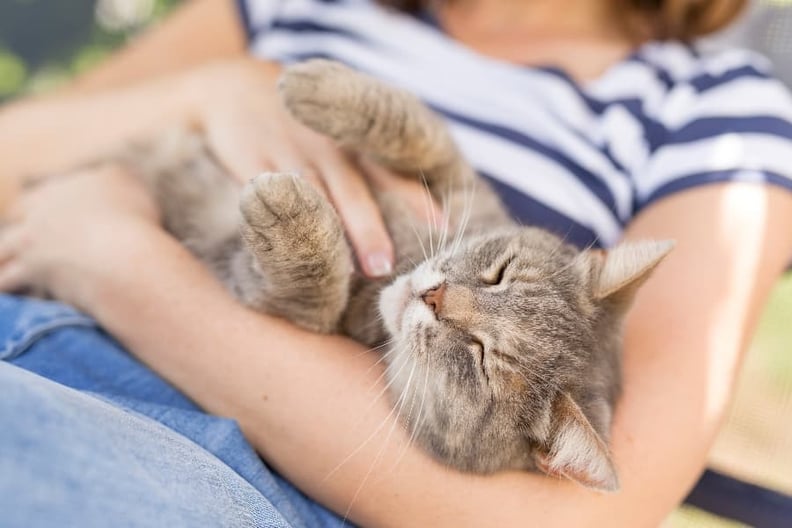
No matter how common the symptoms are, each cat experiences anxiety differently, and that means that no one solution will help in every situation. Dealing with cat anxiety requires a bit of trial and error and a lot of patience.
Most cats need a variety of solutions to help them handle their stress, while others may just get over their anxiety naturally, depending on how their stress was triggered. It's important that you take your time and be as consistent as possible to help your cat adjust.
Don't get discouraged if your cat doesn't respond to your calming solutions right away. Cats can be very stubborn, but with time and practice, you can help your cat destress and find the right routines to keep her calm and happy.
Common Cat Anxiety Questions
What are the signs of an anxious cat?
Anxious cats may exhibit signs such as hiding, excessive meowing, pacing, excessive grooming, aggression, inappropriate elimination, loss of appetite, and changes in sleeping patterns.
Can changes in the environment trigger cat anxiety?
Yes, cats are sensitive to changes in their environment. Events such as moving to a new home, rearranging furniture, or introducing new people or animals can trigger anxiety in cats. Gradual introductions and maintaining familiar elements can help ease their stress.
Can cat anxiety be treated without medication?
Yes, mild to moderate cases of cat anxiety can often be managed with non-medical interventions. These include creating a comfortable and predictable environment, using pheromone diffusers, providing mental and physical stimulation, and offering hiding places.
What are pheromone diffusers, and how do they help with cat anxiety?
Pheromone diffusers release synthetic pheromones that mimic the comforting scent a cat's mother produces. These diffusers can help create a sense of security and calmness in the environment, reducing anxiety-related behaviours.
Are there specific cat breeds more prone to anxiety?
While anxiety can affect any cat, certain breeds may be more prone to experiencing heightened stress. Cats with sensitive temperaments or breeds known for being reserved, such as Siamese and Burmese, might be more susceptible to anxiety.
Can changes in a cat's routine cause anxiety?
Yes, changes in routine can contribute to cat anxiety. Cats are creatures of habit, and disruptions in feeding times, playtime, or interactions with caregivers can lead to stress. Gradual changes and maintaining consistency can help reduce anxiety triggers.
.png?width=200&height=66&name=logo%20(1).png)



.jpg)
